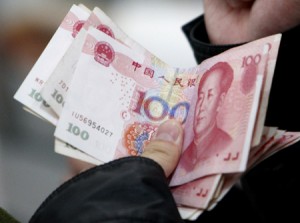Hong Kong, Mainland Businesses to Use Yuan for Trade Settlement
 Jun. 30 – Hong Kong businesses will soon be able to settle international trade in yuan with companies in Guangzhou, Shenzhen, Shanghai, Dongguan and Zhuhai starting next month.
Jun. 30 – Hong Kong businesses will soon be able to settle international trade in yuan with companies in Guangzhou, Shenzhen, Shanghai, Dongguan and Zhuhai starting next month.
The agreement was formalized last Monday by Hong Kong Monetary Authority Chief Executive Joseph Yam and the People’s Bank of China Governor Zhou Xiaochuan.
During the press conference, Zhou Xiaochuan, was quoted by the Wall Street Journal as saying that the arrangement “will effectively reduce risks in foreign-exchange rates and costs in translating foreign currencies while making payment.”
The move hopes to lessen the use of the declining U.S. dollar and make it easier to settle trade with Hong Kong. Prior to the agreement, China’s central bank called for changes in the international reserve currency to move from its dependency on the unstable U.S. dollar to a new reserve currency based on an expanded basket of currencies.
According to the central bank report: “An international monetary system dominated by a single sovereign currency has intensified the concentration of risk and the spread of the crisis.”
The yuan trade settlement agreement is not expected to have huge impact on Hong Kong businesses in terms of overall business cost. A senior analyst at Moody’s Investors Service, Leo Wah, told the WSJ that “it may take at least a few years” before the yuan services has an impact on Hong Kong’s banks.
The Chinese yuan is still a blocked currency outside the country and while the Hong Kong dollar is based on the U.S. dollar, it can still be converted outside the territory. It will mean though that Hong Kong transactions with the mainland will be smoother because the yuan can be used directly instead of first converting it to another currency.
Trial runs of yuan settlement began earlier in Shanghai, Guangzhou, Shenzhen, Zhuhai and Dongguan. Yunnan province and the Guangxi Zhuang autonomous region are also using the yuan for trade payments with members of the Association of Southeast Asian Nations.
- Previous Article Pepsi Opens its First Overseas “Green” Plant in Chongqing
- Next Article Shanghai’s Office Rentals Plunge









